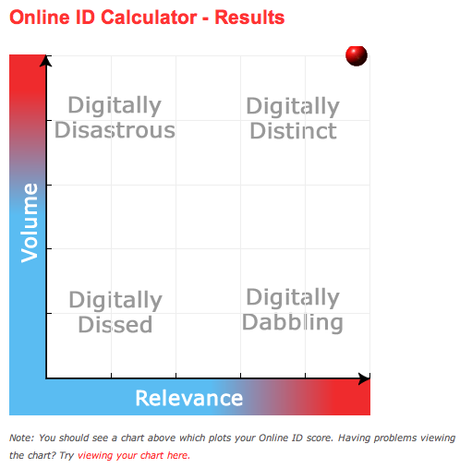The recent passing of the youth wage subsidy bill is a welcome relief – at least in some quarters – given the persisting 50% unemployment rate in this age group in South Africa. Unfortunately, it took 3 years to pass the youth wage bill due to disagreements between government, business and labor. And now Cosatu is threatening to test the veracity of the subsidy in court, given that Treasury apparently bypassed Nedlac. If this happens, then implementation thereof is going to be held hostage.
While the delay continues, the online media can provide opportunities for increasing size of the dent on youth unemployment if properly leveraged. And, this does not need the passing of the law and related hindrances.
Below are 3 of the many steps that youth can take to increase their chances of finding, or creating, employment.
Building an online brand profile

Bra Willy’s GQ Score – 31 October 2013 (source: http://www.onlineidcalculator.com)
One of the talks I attended at the recent Social Media Week in Mumbai was on Developing a Personal Brand. The speaker leading this session, Sunder Madakshira, indicated that in this era of the Internet, strong personal brands have intellectual intelligence (IQ), emotional intelligence (EQ) and a healthy Google Quotient (GQ) – a measure of the breadth and depth of online presence. It is a fact that employers are increasingly using online media as part of prospective employee screening.
Thankfully, social networking has come to play a major role in enhancing one’s GQ, and this is supposed to be good news for many younger netizens who spend most of their online time on Facebook and Twitter. But it has been my experience that the youth are under-utilising social media for building professional brands, or at worse they are using these platforms to send mixed or negative signals about their personal brands. More often than not, social media are used to talk about getting drunk, getting laid and cheating on partners with friends’ partners

A true story. Recently I was looking to employ a Multimedia Designer, and I was contacted by a young man – who will remain nameless – enquiring about the position. One of the first things I did was check his GQ, and I was not impressed by the results. Subsequently, the poor young fellow lost the opportunity to even get an interview.
A perfect example of young netizens who have perfected the science of building personal brands on social media is ISeeADifferentYou, made up of 3 young lads who are passionate about Soweto, and who are telling positive stories about this historic township using beautifully shot pictures from interesting locations. As a result, the trio have attracted attention the whole world over, and scored themselves opportunities to speak at major events including TEDxSoweto.
Registering with various online sites for freelance jobs
Have you got a skill or profession that allows you to do work anywhere in the world? If yes, can your skill be supplied virtually? If yes, are you a self-starter who can produce high-quality work without supervision and are able to complete jobs timeously and cost-effectively? If any young netizen answers yes to all the questions above, there is no reason why Internet-based freelancing should not be explored as an alternative for finding work. I know that the word “freelancing” does not sound permanent employment to many, but there are netizens who have become “full-time” freelancers, and who get jobs all the time if they are good at what they do. In essence, freelancing can become a career.

Elance – online freelance service
There is a growing number of freelance services looking for people who posses skills that can be supplied virtually. Such skills include writing, designing, programming, sales and marketing, engineering and architecture, and administrative support. A blog titled 17 Great Websites to Find Freelance Jobs is a great resource to get you going quickly.
Creating and monetising own digital content.
There are 2 great South African examples in the digital content monetisation space – Caspar Lee and Mdu Comics. Caspar is only 19 and Mdu, the man behind Mdu Comics, is in his mid-30′s. Both of them are huge successes on Youtube with 66 million and 5 million views respectively, and Caspar also has just under 1 million Twitter followers, making him second only to Trevor Noah in the South African Twitter Celebrity League.
Both Caspar and Mdu make a living from their digital content through Google AdSense and product placements/mentions. Mdu’s digital animation wizardry has also resulted in the addition of TV commercial productions such as the most recent Fish and Chips advertising series.
My key insight here is – all it takes to start creating digital content is a little bit of creativity, a phone camera with basic video editing tools, Internet access and lots of experimenting. As the interest in your content by the Internet massive grows, so will the interest of advertisers and marketers.
In closing, none of the actions above are a guarantee of success in finding employment , but they sure will improve chances of it happening. The biggest challenge is that the youth will have to put in the time, commitment and a little bit of money, and these 3 attributes are often scarcely in abundant supply in this age group. But those South African youth who are serious about their future must get going with at least one of the actions and stop finding excuses to delay.
ABOUT THIS BLOG | ABOUT THE BLOGGER | LATEST QUICK DIGI-TIP

